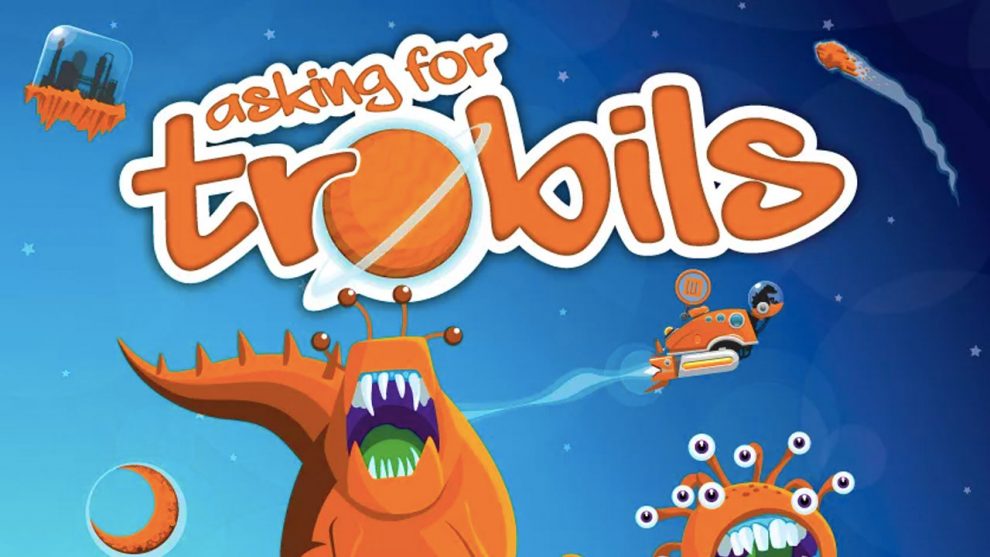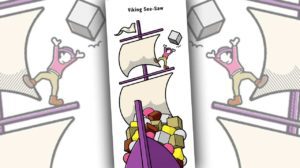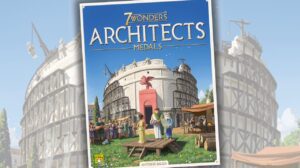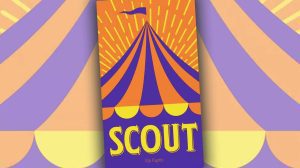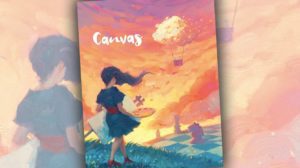Disclosure: Meeple Mountain received a free copy of this product in exchange for an honest, unbiased review. This review is not intended to be an endorsement.
In my mind, there was a seminal moment in the creation of Asking for Trobils in which the creative folks at Kraken Games had a conversation that sounded like this:
“What if we made the whole thing orange?”
“Orange, you say?”
“Orange.”
“What sort of theme goes with orange?”
“I don’t know, fruit?”
“Too obvious.”
“How about the systematic hunting and elimination of a race of space pests?”
“Perfect.”
Regardless of the conversation that brought us to this point, Erin McDonald and Christian Strain made the most of a single color with this fascinating resource-swapping title. Asking for Trobils has since been picked up for publication by Breaking Games (Dwellings of Eldervale, Rise of Tribes, Trellis) and is ready to add expansion materials this year.
Trobils are making life in the O-Renj system very uncomfortable and something must be done. Somewhere between two and seven Trobil hunters must take up the task of setting Paradise Planet free of worry and frustration.
The plan is simple. Visit the planets, stations, and interstellar oddities of the O-Renj system to build and stock the traps necessary to trap the Trobils. If you find yourself in a pinch, you can always cast them into the star at the center of the system for space cash to further fund your endeavors. It all makes sense.
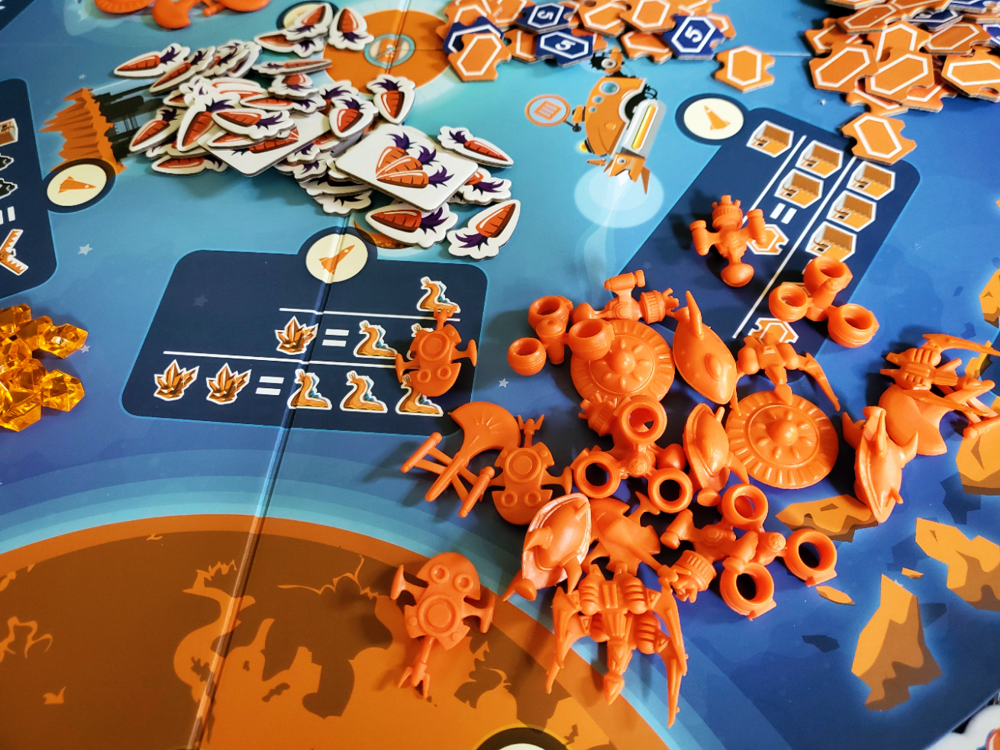
Follow Me, Don’t Follow Me
I know I shouldn’t, but I have to start with the rulebook. I love this rulebook. Not only is the game spelled out with rare clarity, so too is the entire Asking for Trobils experience. The flavor text is charming and informative, making sense of the whole strange hunting endeavor.
But the best page is by far the last. “How to teach Trobils.” To the fine folks at Breaking Games, I say thank you!! Some folks are fantastic game teachers who see through to the core experience and know how to communicate the important details. Others are not. There is a difference between reading the rules and teaching the game. When a design team gives you the layout of the teach, they are giving you a peek into the heart and soul of the game. Every rulebook should have this page. (For tips on teaching and more, check out Meeple Mountain’s resource page for planning a solid game night)
I feel like I understood the game from the first.
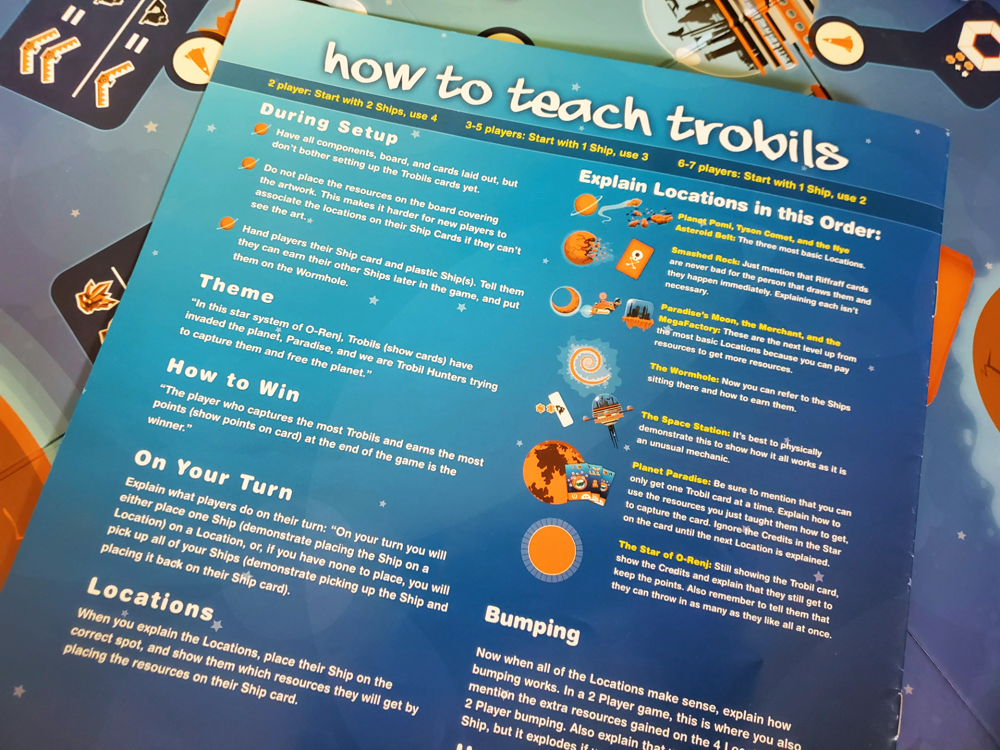
Collar Me, Don’t Collar Me
The circular board is a map of the O-Renj system with the star at the center. Each of the board’s eleven locations either grant resources to the players or provide the opportunity to exchange those resources for other resources.
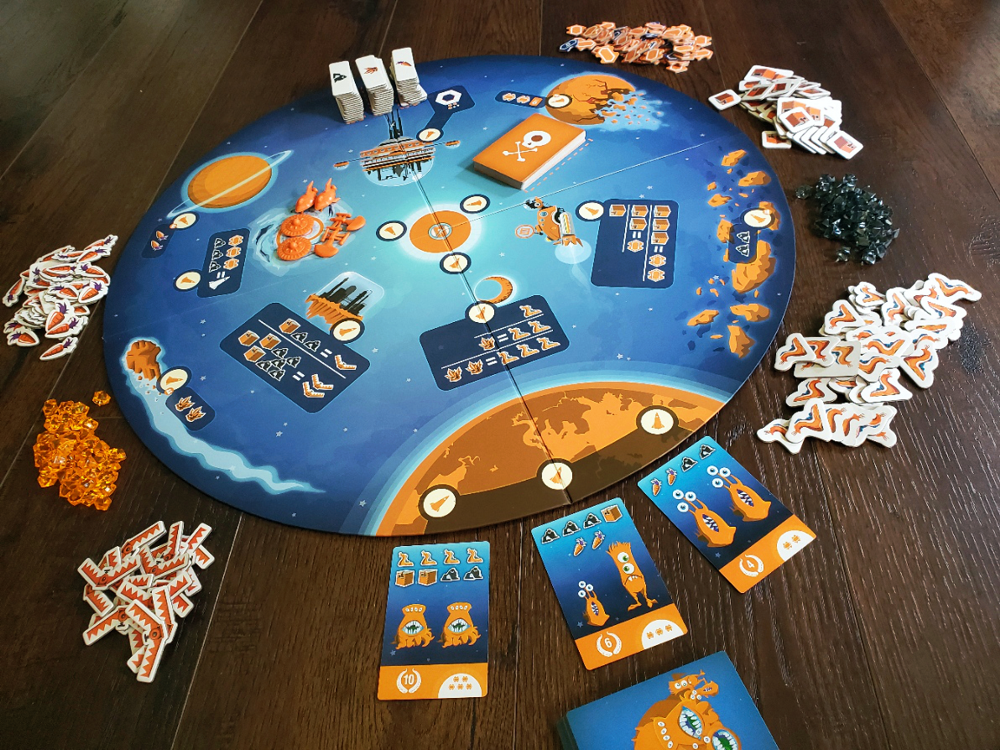 Players visit locations with their orange ships. On a player’s turn, they either place a ship and interact with a location or they pick up all of their ships. If a player wants to visit an occupied location, the ship is bumped back to its owner, saving them the hassle of spending a turn on retrieval.
Players visit locations with their orange ships. On a player’s turn, they either place a ship and interact with a location or they pick up all of their ships. If a player wants to visit an occupied location, the ship is bumped back to its owner, saving them the hassle of spending a turn on retrieval.
Keeping life interesting, one of the locations—Smashed Rock—is the place to meet RiffRaff and grab a few credits (space cash). RiffRaff are cards that provide some sort of mixed blessing to the star system: pirates, sheriffs, bounty hunters. They steal from the rich and they give to the poor. Then again, they also sometimes give to the rich. They shake up the norm and give folks something to think about as they travel about. Standees represent the RiffRaff until they’ve served their purpose and head home.
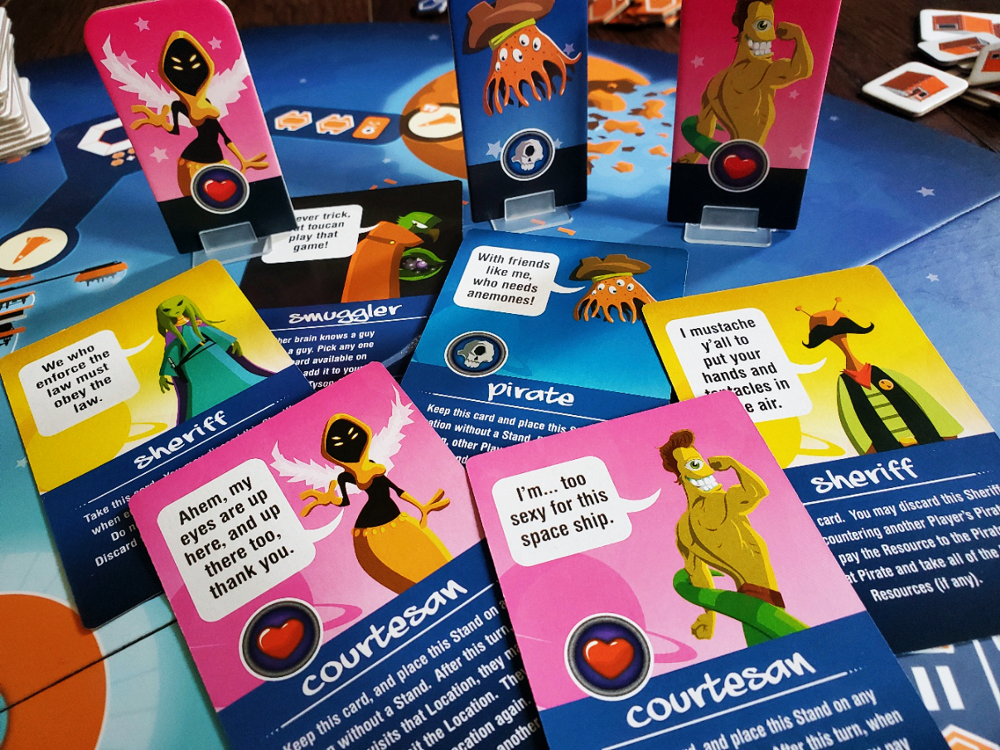 Providing a bit of a boost to the orange ships, the O-Renj station is the place to purchase upgrades. Upgrades provide additional resources at various locations around the system. Placed correctly, these pick-me-ups can turn the orange ship into an orange engine… on a ship.
Providing a bit of a boost to the orange ships, the O-Renj station is the place to purchase upgrades. Upgrades provide additional resources at various locations around the system. Placed correctly, these pick-me-ups can turn the orange ship into an orange engine… on a ship.
Players start the game with some minimal number of orange ships, but there are more available at the wormhole in exchange for the right combination of resources. More ships mean less time wasted retrieving and more opportunities to be bumped.
Finally, at Planet Paradise, players trap the pesky Trobils, spending traps and mega-traps, ore and carrots to collect the cards which are the game’s primary source of Victory points. If a player is strapped for space credits, they can always toss those Trobils into the Star of O-Renj for some cash, but the points have been earned regardless.
As the game rolls on and the Trobils are swept away, City cards start to appear on Planet Paradise revealing endgame bonuses that will provide a few final opportunities to snatch orange victory from the jaws of defeat. When three of these fixed City cards are on display, the game ends. The Trobil hunter with the most points wins.
We Are Agents of the Free
For any fans of the Century series of games, Asking for Trobils should sound like a singularly colored worker-placement uncle. Spice Road and Golem arrived a couple years after the space pests; employing the same basic concept of resource exchange through a card engine. I am a fan of those titles, but I’m also a big fan of worker-placement, so I took to the Trobils from the beginning.
For a game that invites two players and seven players, Asking for Trobils scales very well. One key is in the quantity of orange ships. Two-player outings start with two ships each with two additional ships available in the Wormhole. With three to five players, the count moves to one with two more available. At six and seven players, one ship can become two. In every iteration, the board is crowded without being absurdly saturated, keeping bumping mighty plentiful. The two-player iteration adds a resource bonus with a bump, which allows for faster Trobil trapping.
Another key is in the Trobil count. During setup, the endgame is created by shuffling together a number of City and Trobil cards so that they leak into the game with a hint of surprise. The card counts change according to the player count, creating a tighter experience with seven at the table. Nearly every game we played clocked in just heavy of an hour, but the scores were quite different with two and seven players!
I was surprised at the strategic variety in the O-Renj system. Don’t get me wrong, everyone is doing the exact same thing. But the agony of decision-making varies based on a player’s approach. In one five-player outing, I acquired both additional ships from the Wormhole and upgraded them to the nines. My son acquired one and only took upgrades when they were forced upon him by the RiffRaff. My daughter only used her one, lonesome, original stock ship. Our scores were close. In this case, I did not win. Had the City cards given me another turn or two—or the right endgame bonus—I would have won because of the steroid-addled engine I built. However, there’s no way to predict the end. I appreciate that there is no one path, even though everyone is on the same path.
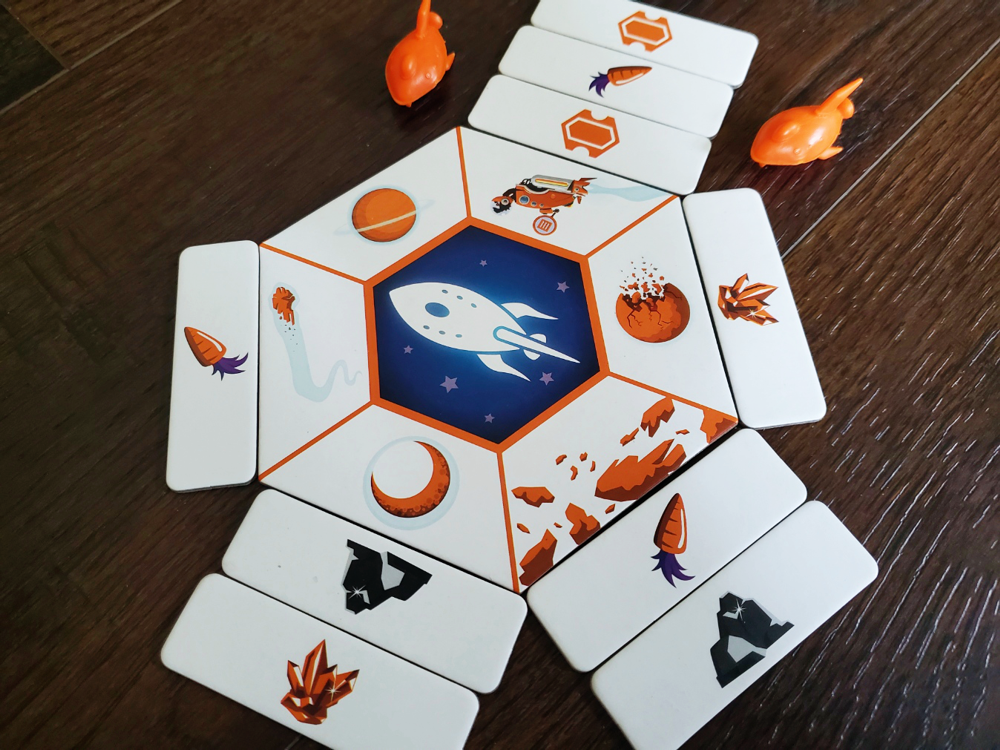 I played this with a table of adults and we all enjoyed the tension of trying to visit locations without giving anyone the assist of a bump. I also played with my four-year-old, and she managed to capture some Trobils against her siblings. She loved the RiffRaff, who are delightfully decorated with flavor text that mimics several familiar sci-fi worlds. Out in the gaming wild, several very familiar-looking orange ship options are also available for anyone who’d rather sail the universe in an orange phone booth, an orange DeLorean, or an orange smuggler vessel capable of making the Kessel run in twelve parsecs.
I played this with a table of adults and we all enjoyed the tension of trying to visit locations without giving anyone the assist of a bump. I also played with my four-year-old, and she managed to capture some Trobils against her siblings. She loved the RiffRaff, who are delightfully decorated with flavor text that mimics several familiar sci-fi worlds. Out in the gaming wild, several very familiar-looking orange ship options are also available for anyone who’d rather sail the universe in an orange phone booth, an orange DeLorean, or an orange smuggler vessel capable of making the Kessel run in twelve parsecs.
There is something in this box for everyone. Asking for Trobils will welcome two new expansion titles this year. I can’t say what that will do to the O-Renj system, but I can say the base game is worth peeling into.
One year later…
I played Asking for Trobils this afternoon (just over a year later) when my daughter asked for a game. The orange still speaks. We tried the expansions, but they ultimately left the collection after a few plays. We’re really just fans of the base game. We’ve grown more accustomed to the system and, as a result, we find we’re able to adjust the Trobil deck with some accuracy to tinker with the play time. We’ve also settled into drafting a resource or two right out of the box to jump start a few options. We want that action! The charm hasn’t worn off yet, and there’s still a bit of tension in that race to the finish.


